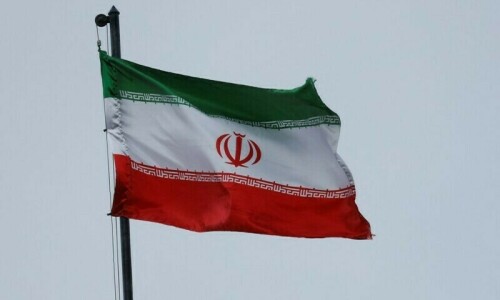KARACHI: The people affected by demolition of encroachments along with Gujjar and Orangi Nullahs, Karachi Circular Railways tracks and Bahria Town raised their voices against climate injustice, anti-poor development and the builder mafia during a ‘Karachi Bachao Tehreek’ conference held on the topic of ‘Land rights and the housing crisis in Karachi’, which also brought together activists, journalists and community organisers working on land and housing rights at the Institute of Business Administration on Sunday.
Several women victims of demolition spoke about their plight during the discussion on gender and resistance.
Maria Yaqub, who lost her late parents’ home at Gujjar Nullah, said that the demolition changed her life. “We are now all getting organised and working towards bringing about a revolution,” she said.
Victims share how their lives were shattered by bulldozing of houses built along drains
“With our homes gone, we were left to fight for ourselves. There was suddenly no water, no electricity, no gas and above all no privacy. We were left with no choice but to fight back,” she said.
Ayesha Malik, one of the KCR affectees, said that they were issued notices along with innumerable threats two years ago “but we came out to hold our ground. We fought back and saved our homes. Today when I see that Gujjar Nullah and Orangi Nullah people left without a roof over their heads, I say to myself that it could have been us. We fought and we refused to accept what was being said would be our fate. We were outnumbered but we knew that we have God Almighty on our side. Today we have learned to fight for ourselves and for others,” she said.
Sonia Arif, whose home at the Gujjar nullah was also bulldozed, said that she is just a simple housewife. During a protest at Bilawal Chowk, her little son’s feeder got lost. “I was arrested along with my little boy. He was crying because he was hungry. But I held my ground despite having lost my home 11 months before that,” she said.
Zara Islam said her entire neighbourhood was demolished. Her family was against her stepping out to raise her voice against the injustice. “But my home was being broken. How could I have turned away from that reality? When the KMC officials arrived with bulldozers, I was alone at home. They ordered me to come out or they will bulldoze me as well. But I refused. I was arrested and my home flattened anyway. Still I fight and urge others to fight with me,” she said.
An affectee of Orangi Nullah said that her home worth Rs four million was demolished and she was still awaiting compensation.
Another affectee pointed out that the compensation was only handed out in front of the media, and that, too, to ‘friends’ of officials.
“Common and poor folks like us are still awaiting our cheques. Some of us are not even taken into account with no IDs registered,” she said.
“People here go for individual goals, not collective for betterment,” said Yousuf Masti Khan of the Awami Workers Party when talking about the lack of planning by the government that failed to develop the city in accordance with influx of population.
“There were no surveys carried out as people came and settled in Karachi, which only had a population of 300,000 before Partition. But the city grew rapidly without anything being done to expand its infrastructure,” he pointed out.
“And as this happened, and more resources and land were needed, the indigenous people of this city were uprooted as their goths or settlements were flattened in favour of new landlords and industrialists. Even now, whenever there is talk of building a new Karachi, the indigenous fall prey but with that they are killing this city’s history, culture, traditions, language and heritage,” he said.
Rukhman Gul Palari, professor at the department of Sindhi, University of Karachi, said that by ruining the heritage of people, you just erase or finish them. “Here people are quite unaware of the relics being destroyed in the name of coming up with new recreational spots and housing schemes,” he said.
He said that the Malir river’s catchment area, which kept Malir green, has been turned into a kind of dam as DHA City and Bahria Town have been built around it. “The results of this will be felt soon. The livelihoods of the indigenous through agriculture, poultry and livestock, along with all flora and fauna of the area will be destroyed as factories will come up in the green belt to further ruin the environment,” he lamented.
Earlier, the Karachi Bachao team explained in depth the method of the survey used by the government before the demolitions.
“It was an aerial survey carried out with the help of a drone. There was no proper ground, door-to-door survey. The survey done never calculated the human cost. There were more than one family living in a house, which the aerial survey didn’t show. Also there were more homes demolished than the count given so many will get no compensation. There were 70,000 homes bulldozed but the government figure is 435.”
Jahazaib Baloch, a local of Malir, Amna Baloch of Baloch Yakjehti Committee, psychologist and activist Maazah Muhammad Ali, writer and community organiser Aiman Rizvi and another affectee Arif Hussain also spoke among others.
Published in Dawn, November 1st, 2021

















































